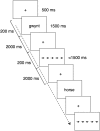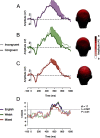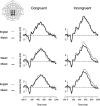Fast modulation of executive function by language context in bilinguals
- PMID: 23946411
- PMCID: PMC3742936
- DOI: 10.1523/JNEUROSCI.4760-12.2013
Fast modulation of executive function by language context in bilinguals
Abstract
Mastering two languages has been associated with enhancement in human executive control, but previous studies of this phenomenon have exclusively relied on comparisons between bilingual and monolingual individuals. In the present study, we tested a single group of Welsh-English bilinguals engaged in a nonverbal conflict resolution task and manipulated language context by intermittently presenting words in Welsh, English, or both languages. Surprisingly, participants showed enhanced executive capacity to resolve interference when exposed to a mixed compared with a single language context, even though they ignored the irrelevant contextual words. This result was supported by greater response accuracy and reduced amplitude of the P300, an electrophysiological correlate of cognitive interference. Our findings introduce a new level of plasticity in bilingual executive control dependent on fast changing language context rather than long-term language experience.
Figures




Similar articles
-
Electrophysiological explorations of the bilingual advantage: evidence from a Stroop task.PLoS One. 2014 Jul 28;9(7):e103424. doi: 10.1371/journal.pone.0103424. eCollection 2014. PLoS One. 2014. PMID: 25068723 Free PMC article.
-
Neurophysiological marker of inhibition distinguishes language groups on a non-linguistic executive function test.Brain Cogn. 2013 Dec;83(3):330-6. doi: 10.1016/j.bandc.2013.09.010. Epub 2013 Oct 18. Brain Cogn. 2013. PMID: 24141240
-
Age-related effect on language control and executive control in bilingual and monolingual speakers: Behavioral and electrophysiological evidence.Neuropsychologia. 2020 Feb 17;138:107336. doi: 10.1016/j.neuropsychologia.2020.107336. Epub 2020 Jan 8. Neuropsychologia. 2020. PMID: 31923527
-
Neural differences in the temporal cascade of reactive and proactive control for bilinguals and monolinguals.Psychophysiology. 2021 Jun;58(6):e13813. doi: 10.1111/psyp.13813. Epub 2021 Mar 14. Psychophysiology. 2021. PMID: 33719030
-
Are there bilingual advantages on nonlinguistic interference tasks? Implications for the plasticity of executive control processes.Psychon Bull Rev. 2011 Aug;18(4):625-58. doi: 10.3758/s13423-011-0116-7. Psychon Bull Rev. 2011. PMID: 21674283 Review.
Cited by
-
Interactional context mediates the consequences of bilingualism for language and cognition.J Exp Psychol Learn Mem Cogn. 2020 Jun;46(6):1022-1047. doi: 10.1037/xlm0000770. Epub 2019 Oct 3. J Exp Psychol Learn Mem Cogn. 2020. PMID: 31580119 Free PMC article.
-
Does language context impact the neural correlates of executive control in monolingual and multilingual young adults?Brain Lang. 2021 Nov;222:105011. doi: 10.1016/j.bandl.2021.105011. Epub 2021 Aug 26. Brain Lang. 2021. PMID: 34455164 Free PMC article.
-
Bilingualism can cause enhanced monitoring and occasional delayed responses in a flanker task.Eur J Neurosci. 2023 Jan;57(1):129-147. doi: 10.1111/ejn.15863. Epub 2022 Nov 23. Eur J Neurosci. 2023. PMID: 36373596 Free PMC article.
-
The Effect of Code-Switching Experience on the Neural Response Elicited to a Sentential Code Switch.Languages (Basel). 2022 Sep;7(3):178. doi: 10.3390/languages7030178. Epub 2022 Jul 11. Languages (Basel). 2022. PMID: 36188491 Free PMC article.
-
ERP and Behavioural Correlates of Prospective Memory in Bilinguals during L1 and L2 Processing.Brain Sci. 2023 Feb 20;13(2):365. doi: 10.3390/brainsci13020365. Brain Sci. 2023. PMID: 36831908 Free PMC article.
References
-
- Bialystok E. Bilingualism in development: language, literacy, and cognition. New York: Cambridge UP; 2001.
-
- Bialystok E. Cognitive effects of bilingualism: how linguistic experience leads to cognitive change. IJBEB. 2007;10:210–223.
Publication types
MeSH terms
Grants and funding
LinkOut - more resources
Full Text Sources
Other Literature Sources
Miscellaneous
